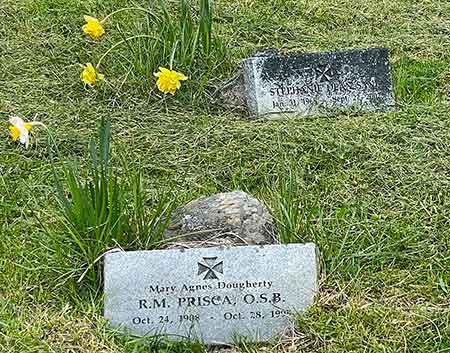PRAYER & LITURGY

“On this day is observed the commemoration of the faithful departed, in which our common and pious Mother the Church, immediately after having endeavored to celebrate by worthy praise all her children who already rejoice in heaven, strives to aid by her powerful intercession with Christ, her Lord and Spouse, all those who still groan in purgatory, so that they may join as soon as possible the inhabitants of the heavenly city. ”
—Roman Martyrology for the Feast of All Souls
The day after the Solemnity of All Saints the Church celebrates All Souls Day when we pray for the souls of the dead, those dearly beloved to us who have passed away and those we don't know. On November 1st we prayed for the Communion of Saints who rejoice with God in heaven. On this feast we the living pray for the faithful departed, those who have died in Christ but are not yet wholly purified, that their time of purification before they see God face-to-face may be shortened. The faithful departed cannot pray for themselves, so we must pray for them. And we can ask that they pray for us! St. Francis de Sales admonishes us: "Alas! We do not sufficiently remember our dear departed, their memory seems to perish with the sound of the funeral bells, and we forget that the friendship which finds an end, even in death, was never genuine friendship."
At Mass for All Souls Day here at our monastery and at the Abbey of Regina Laudis we have the tradition of saying out loud the names of community and family members and friends who have passed away during the year as our Prayer of the Faithful at Mass. This is not meant to be a sad, lugubrious celebration. In a culture desperately fighting to stay forever young and so afraid of death, there is a peace in facing the Last Things, our mortality. The Gregorian Chants of the Requiem Mass are some of the most beautiful pieces ever written. The text of the sequence Dies Irae from the Mass inspired composers throughout the centuries such as Mozart, Verdi, Fauré and many others to put the text to music. Some may find the language evoking fire and brimstone frightening. Yet, the cry for and belief in God's mercy resounds throughout the piece: "Having absolved Mary [Magdalene], and heard the plea of the thief, may you give me hope as well." ending with poignant please to Jesus: Pie Iesu Domine, Dona eis requiem—Sweet Lord, Jesus, grant them rest. The tone is somber, yet full of hope. Those who have the privilege to sing this music and those who hear it find it comforting. An anonymous writer in an article What the Requiem Mass Meant to Me, describes the Mass as "...not dreadful or terrifying, but honest, truth-telling". All Souls Day is ultimately not so much about punishment than about purification, driven by desire to see God and love. In an Audience of January 2011 Pope Benedict XVI, in reminding the Faithful to pray for the dead "...so that they can attain the blessed vision of God", invoked the words of St. Catherine of Genoa on the purification of purgatory:
“The soul is conscious of the immense love and perfect justice of God and, in consequence, suffers for not having responded correctly and perfectly to that love, and that is why the love itself of God becomes a flame. Love itself purifies it from its dross of sin.”
It is not surprising then that Oscar Wilde quipped: "Catholicism is the only religion to die in!"
Listen to a Gregorian Chant recording of the Sequence Dies Irae.
O day of wrath, that day,
when the earth will be reduced to ashes,
as David and the Sibyl both testify!
What great fear there will be,
when the judge comes
to judge all things strictly
A trumpet casts a wondrous sound
into the realm of the tombs,
calling all [to come] before the throne.
Death and nature will both marvel
as the [human] creature rises
to answer its judge.
A book will be brought forth
in which all things are recorded—
all that for which the world will be judged.
When, therefore, the judge appears,
all that is hidden will appear,
and no ills will remain unavenged.
As miserable as I am, what am I to say?
whose protection may I invoke,
when even the just lack security?
O most majestic King,
who freely saves those to be saved,
save me, source of mercy!
Remember, merciful Jesus, that I am the one for whom you came: may I not be lost on that day!
When, therefore, the judge appears,
all that is hidden will appear,
and no ills will remain unavenged.
Seeking me, you sat down tired:
to redeem me, you suffered the Cross—
may your toil not be in vain!
Just and avenging judge,
may you grant remission [of sins]
before the day of reckoning.
Guilty, now I sigh,
my face red with shame:
save thy petitioner, O God!
Having absolved Mary [Magdalene],
and heard the plea of the thief,
may you give me hope as well.
Though my prayers are not worthy,
be kind to me, O Good One,
that I may be spared the eternal fire!
Place me among the sheep,
and separate me from the goats,
setting me at your right hand.
When the wicked are confounded
and given over to bitter flames:
call me among the blessed.
Meek and humble, I pray,
with a heart contrite as ashes:
Help me reach my final end.
How tearful that day will be,
when from the ashes will arise
the guilty man for judgment.
Therefore spare him, O God!
Merciful Lord Jesus,
grant them rest. Amen.
(Translation of Dies Irae by Joseph Koczera, S.J.)
